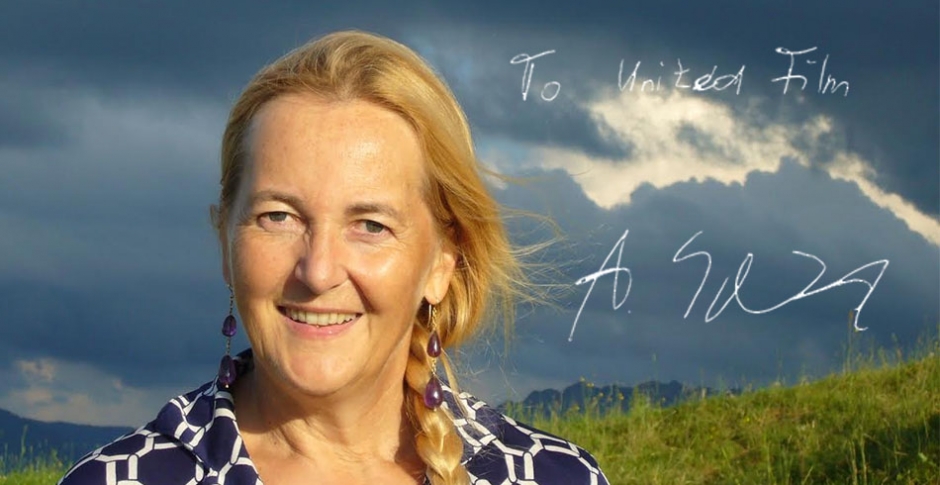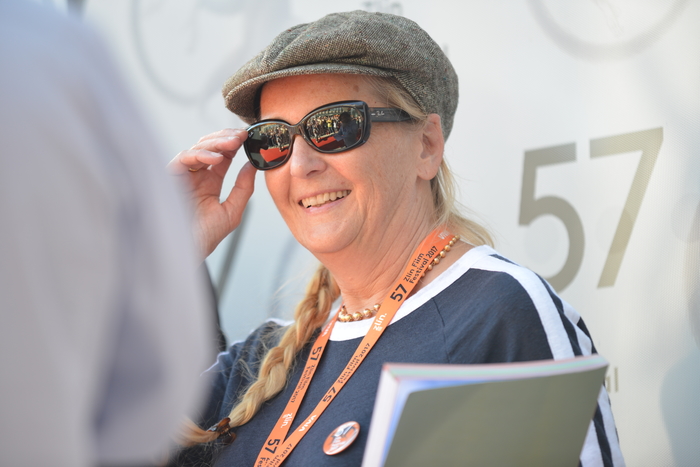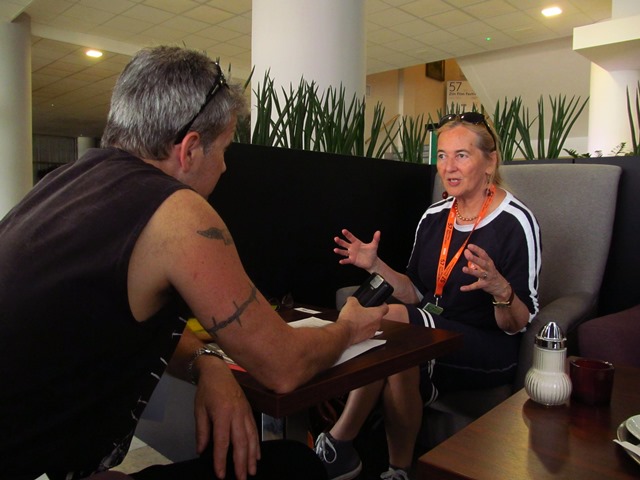Alice Schmid – It is my life mission to make films about kids
Written by Eva Csölleová, Vítek FormánekIf there was a term “one-man-show“ in film making, Alice Schmid would be the man, ehm, the woman for that. Zürich based Swiss director was the guest at Zlín film festival and revealed us incredible ways of her filming job.
Switzerland is not as hot bed for film industry so what made you to become a film director?
It was by coincidence. I went to school and my mother wanted me to become a teacher but I was too shy and everybody told her I won´t be a good teacher. Then I went to art school and I saw a guy drawing Easter decorations, chocolate animations jumping in the forest. I was so fascinated by his drawing, that I asked him, what was he doing. He replied that they make an advert for these chocolate animals in Italy and I asked him if I could work for him. He gave me a phone number to Italian producer and luckily I already knew Italian. He invited me to Milano and I learnt there everything. From editing, camera, sound to production job and I did that for more then 15 years. Then I made my first film called Say No, and it became so famous and it was big success. It´s a short film about sexual abuse and it was showed in all schools. After that I started to learn writing the scripts. I was making film all the time and around the world and when I had a time I always went to workshops.
Your country didn´t have film industry up until 30´s due to consisting of three language districts which troubled you for long time. Do you have central film institute and central funding or is it still influenced by French, German and Italian districts?
I live in German district so I write German and speak Swiss German. In our capitol Bern we have Government Department of Culture. So irrespective from which district you come from, you can send there a script and apply for the money. There is also one big foundation in Zürich so you can apply for money there to but you have to either live or have an office there.
I was living there for some time and still have my office there, that is why I can apply here for funds, then I can apply also in Bern because I am Swiss and also I can apply at some very small foundations.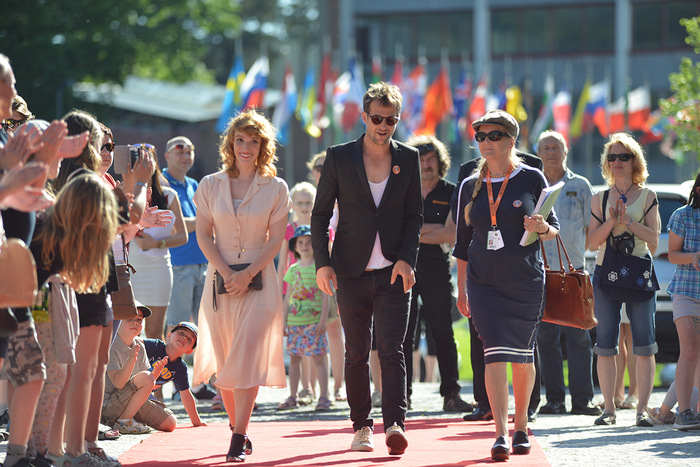
Do the future film makers have to go and study abroad, to bring back experience or you have some film school which they can attend? Who teaches there when you don´t have too many experienced film makers?
When I was twenty, in 70´s, there was no possibility to study film in Switzerland. There were many good universities but not for film so we had to go abroad. There is big company Kondor Film Production and anybody from Switzerland who works now as editor or cameraman or producer went through this company. Now we have schools in Zürich sand Luzern, the former is more for fiction the latter is for documentaries. There is also one in Bern and Lausanne so now Swiss would- be- film makers don´t have to go abroad. They are taught by Swiss film makers of my generation. But we also have people from abroad coming here to make workshops or master classes.
Your country makes lots of documentaries but no feature films. Why do you think that is the case and how are films funded?
On this festival in Zlín we have this film Heidi, which was made by two very young producers who also live near Luzern. It had huge success and it goes around the world and in America. In Switzerland it was watched by half a million viewers. It was co-production between Germany and Switzerland and they had only about 9 million Franks. Switzerland doesn´t have money for feature films but we do lots of documentaries. Important co-producer is our TV who helps a lot with funding..
I, for example, didn´t get eve one dollar for my latest film, which I show here. People refused the story saying that I can´ t be making the film with fifty children. But I insisted on doing it, even when I had no money. I bought a Sony Camera, I had sound construction looking like robot at my back and went to the mountains to shoot 365 days just by myself. At the beginning people high up in the mountains laughed at me but after while they got used to me. After year and half I showed piece of that film to Swiss television and they were fascinated by that and gave me money for editing. And it became such a huge success tha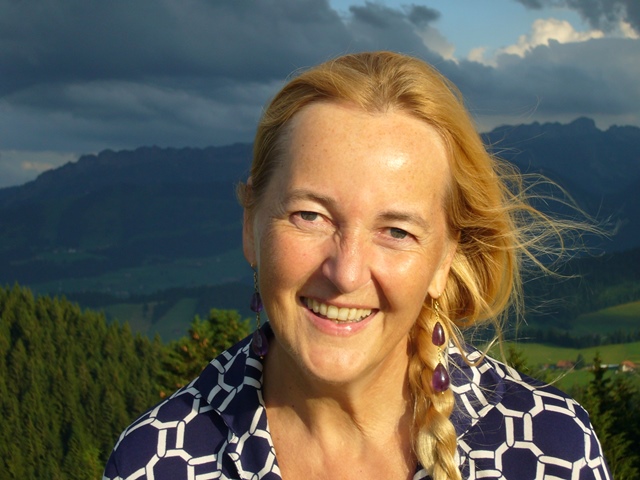 t it was opening film for Berlinale in its section so I proved that one can do it.
t it was opening film for Berlinale in its section so I proved that one can do it.
Do you have any big studios where crews would be coming to make a film?
There is one big studio in Zürich but it´s for TV. Crews come to Switzeland to shoot outside in the mountains or countryside, because it´s beautiful.
Usually independent film is alternative to main stream. Do you have any independent film scene, festivals and network or it is non- existent?
Yes, we have lots of that stuff in Switzerland and as you know now, that´s how I made all my films. That first film Say No, was made in 1990 and every newspaper in my country, almost 100 of them, wrote about that. That was good publicity and advert for that. Because of that success I made my next film in Cambodia about children living in landmine rise fields which is one of the most dangerous places in the world. It was a success again and I won many prices on various festivals, so I could do my next film. So this is the example how it works, I had no money for film but because of success I got some and could do my next film.
You chose to make documentaries about children around the world. Why was that, easier to find funds for that or your personal attitude and mission?
I honestly don´t know. I was too shy to speak in front of the children and was told I would never be a good teacher. I think the most interesting human beings to make films about are the children because they are authentic, they are how they are, they don´t act. You must ask them good questions and you must do good castings, it is a long process. For example, I wanted to find a girl, who was young and wanted to become a dancer, which is big tradition in Cambodia,.but Pol Pot killed all the dancers.-2000 in all- and only 3 survived and escaped. And one of them was playing in my film as a grandmother and she was of course the best dancer I could have. So I think, making films about children is my life mission.
In 1996 you formed Cine A.S. Ltd. Did you want to become as independent as possible and have control over everything or you created it to help other film makers?
Both. At the beginning I asked many producers to produce my films, but they declined. From my years of working in Milano I knew all the professions so I was independent and became also a controller. You know, once you start making your own films and it works, you don´t wanna stop, you want keep working.
Apart from making documentaries and feature films, you also write novels. Your first one became a best seller. Was it because you couldn´t transfer onto screen what you had in mind or you find writing easier and cheaper way how to reach people and deliver the message?
That is very very good question, the best I had. I lived through difficult childhood and I didn´t talk to anybody. Then I made this film, all by myself and got bit tired but I always wanted to write a story about nine years old girl, half autobiographic, half of all stories I have seen around the world, you know story about those small losers. So I went to an old place in the mountains, shut myself there for three months and was writing and writing. And I felt very comfortable about that because I wrote something I never said to anybody. By coincidence I read about some writer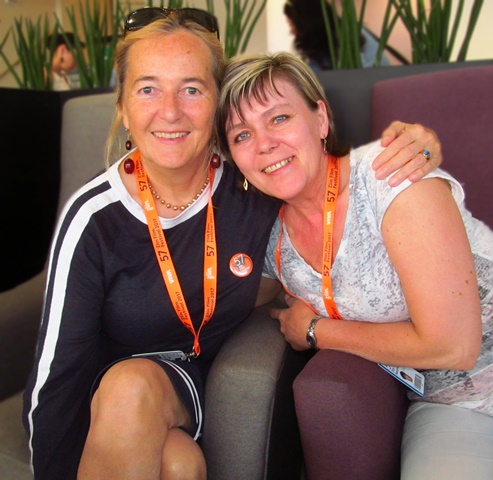 ś competitions and I send there the manuscript and it won the price, I found an editor and it became a bestseller. I wanted to do a film about the subject that I wrote about but I couldn´t. I don´t know why, maybe because it was already done, written.
ś competitions and I send there the manuscript and it won the price, I found an editor and it became a bestseller. I wanted to do a film about the subject that I wrote about but I couldn´t. I don´t know why, maybe because it was already done, written.
Do you separate writing from directing or you intend to film your other books?
At the moment I am in bit of chaos. I am writing a novel which I think will become my next film.I walk and have my note book and always write there notes and ideas.


